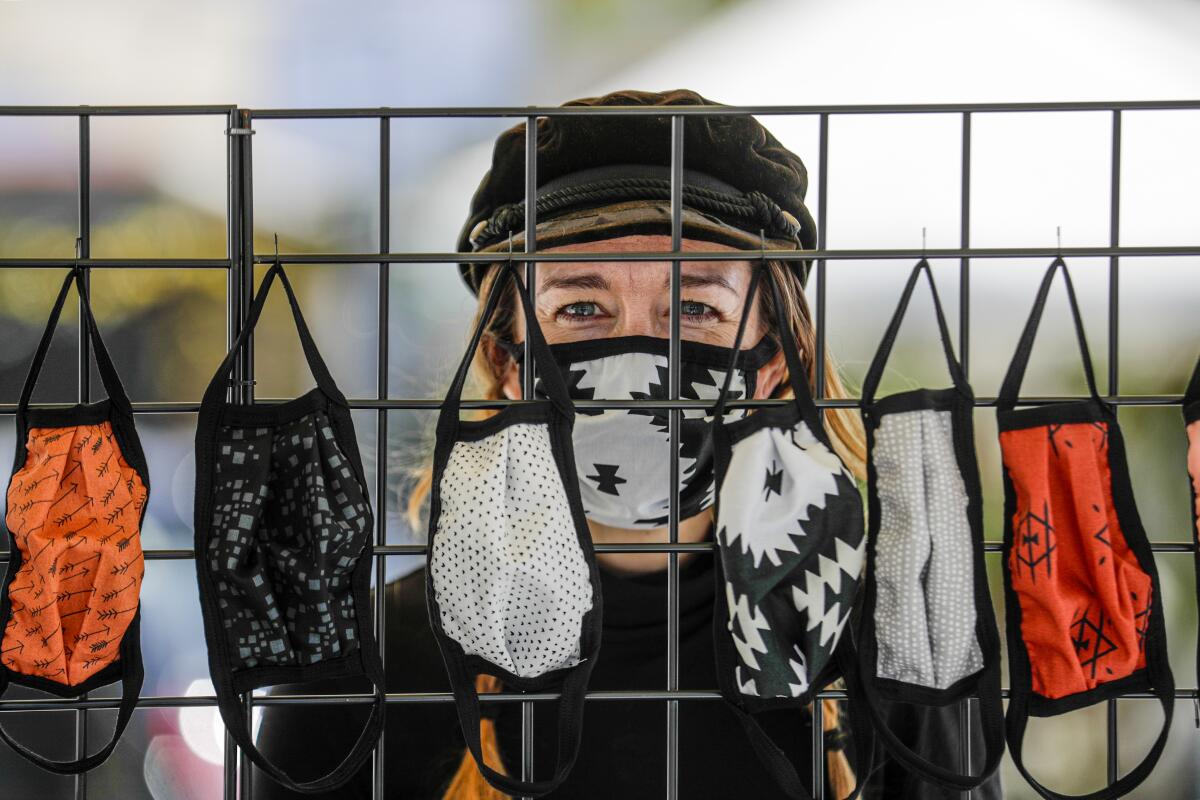L.A. weighs requiring masks when people leave their homes

- Share via
Los Angeles leaders are exploring whether to require Angelenos to have masks or other facial coverings whenever they leave their homes, a proposal championed by Councilman Paul Koretz as a way to prevent new infections.
“The last thing we need is another spike in cases to set us back as we’re trying to move forward,” Koretz said.
The council has not yet decided to draft such a law, but voted Wednesday to ask city staffers to report back on health guidelines for wearing masks, what requirements have been imposed by other cities, and how such rules might be enforced.
Mayor Eric Garcetti has ordered that people wear masks or other facial coverings when they visit many essential businesses, including grocery stores, laundromats, hotels and restaurants offering takeout. Workers at such businesses must be provided masks by their employers, a measure meant to ensure employee safety.
But the order does not require Angelenos to wear masks in other instances when they leave their homes — for instance, while strolling down the sidewalk or sitting in a public park. Koretz argued the city should go farther.
“People still walk dogs. They still ride bicycles. They still may stop and chat with their neighbors,” Koretz said in an interview. “This would reduce the spread.”
Koretz said that under such an ordinance, people would be required to have the masks either already on their faces or close at hand so they could put them on quickly whenever they approach someone from outside their household.
The councilman argued that mandating that people cover their mouths and noses would save lives, by helping to keep people who are asymptomatic but carrying the COVID-19 virus from unknowingly transmitting it. He pointed to the Czech Republic, which imposed a similar requirement, as an example of how the mandate could clamp down on new infections.
A recent article in the Atlantic, co-written by university professors and a researcher who helped found the Masks4All campaign, stressed that if 80% of people wore masks that were modestly effective in protecting other people around them from being infected — such as cloth masks — it would reduce transmission “enough to halt the spread of the disease.”
The Westside councilman argued that a broader measure requiring masks would be helpful even if the city did not crack down on people who fail to wear masks with fines or other penalties. He likened it to banning smoking in restaurants, which he said was enforced mainly through “peer pressure” from other customers.
When Koretz first raised the idea last month, several council members were dubious. Some said the council should leave decisions about masks to Garcetti and public health officials. Others said they were concerned about penalizing people who cannot easily afford or access masks.
At Wednesday’s meeting, some council members remained uncertain: Councilman Gil Cedillo raised concerns about racially discriminatory enforcement of mask rules against African Americans.
Councilman John Lee also expressed reluctance, saying that in his community, people seemed to be behaving responsibly to maintain social distancing and that “people already feel confined as it is.”
Koretz suggested that the city could exempt young children, people with developmental disabilities or conditions that make it difficult to wear a mask, and anyone who would face a health or safety risk — carve-outs similar to those made by other jurisdictions such as San Diego County and Laredo, Texas, the councilman said.
Ahead of the Wednesday vote, an Echo Park resident who phoned into the meeting argued that more exceptions were needed — “for driving, for isolated exercise, for outings in the park.” If not, Darcy Harris argued, “the costs to the physical and mental health to our citizens outweigh the public health benefits.”
The council asked to staffers to bring back the informational report in a week.
More to Read
Sign up for Essential California
The most important California stories and recommendations in your inbox every morning.
You may occasionally receive promotional content from the Los Angeles Times.











